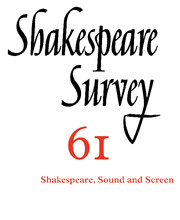Book contents
- Frontmatter
- Sarah Siddons, theatre voices and recorded memory
- Playing with Shakespeare’s play: Branagh’s Love’s Labour’s Lost
- Bottom and the gramophone: Media, class and comedy in Michael Hoffman’s A Midsummer Night's Dream
- Maurice Evans’s Richard II on Stage, Television and (Almost) Film
- Richard II on the Screen
- ‘Where Lies Your Text?’: Twelfth Night in American Sign Language Translation
- ‘This uncivil and unjust extent against thy peace’: Tim supple’s Twelfth Night, or what violence will
- ‘There’s no such thing’: nothing and nakedness in Polanski’s Macbeth
- Ghosts and mirrors: the gaze in film Hamlets
- ‘Ben, it’s a terrible thing to hate your mother’: mind control in Hamlet and The Manchurian Candidate
- Channelling the ghosts: the Wooster Group’s remediation of the 1964 Electronovision Hamlet
- Listening to Prospero’s Books
- Lend Me Your Ears: Sampling BBC Radio Shakespeare
- An Age of Kings and The ‘Normal American’
- Shakespeare and British Television
- A Local Habitation and a Name: Television and Shakespeare
- Paying attention in Shakespeare parody: from Tom Stoppard to YouTube
- Madagascan will: cinematic Shakespeares / transnational exchanges
- Still life? Anthropocentrism and the fly in Titus Andronicus and Volpone
- Riddling q1: Hamlet’s mill and the trickster
- ‘Speak, that I may see thee’: Shakespeare characters and common words
- Who do the people love?
- A Partial Theory of Original Practice
- Shakespeare Performances in England, 2007
- Professional Shakespeare productions in the British Isles, January–December 2006
- The Year's Contributions to Shakespearian Study 1 Critical studies
- 2 Shakespeare in performance
- 3a Editions and textual studies
- 3b Editions and textual studies: The RSC Complete Works
- Index to Volume 61
Playing with Shakespeare’s play: Branagh’s Love’s Labour’s Lost
Published online by Cambridge University Press: 28 November 2008
- Frontmatter
- Sarah Siddons, theatre voices and recorded memory
- Playing with Shakespeare’s play: Branagh’s Love’s Labour’s Lost
- Bottom and the gramophone: Media, class and comedy in Michael Hoffman’s A Midsummer Night's Dream
- Maurice Evans’s Richard II on Stage, Television and (Almost) Film
- Richard II on the Screen
- ‘Where Lies Your Text?’: Twelfth Night in American Sign Language Translation
- ‘This uncivil and unjust extent against thy peace’: Tim supple’s Twelfth Night, or what violence will
- ‘There’s no such thing’: nothing and nakedness in Polanski’s Macbeth
- Ghosts and mirrors: the gaze in film Hamlets
- ‘Ben, it’s a terrible thing to hate your mother’: mind control in Hamlet and The Manchurian Candidate
- Channelling the ghosts: the Wooster Group’s remediation of the 1964 Electronovision Hamlet
- Listening to Prospero’s Books
- Lend Me Your Ears: Sampling BBC Radio Shakespeare
- An Age of Kings and The ‘Normal American’
- Shakespeare and British Television
- A Local Habitation and a Name: Television and Shakespeare
- Paying attention in Shakespeare parody: from Tom Stoppard to YouTube
- Madagascan will: cinematic Shakespeares / transnational exchanges
- Still life? Anthropocentrism and the fly in Titus Andronicus and Volpone
- Riddling q1: Hamlet’s mill and the trickster
- ‘Speak, that I may see thee’: Shakespeare characters and common words
- Who do the people love?
- A Partial Theory of Original Practice
- Shakespeare Performances in England, 2007
- Professional Shakespeare productions in the British Isles, January–December 2006
- The Year's Contributions to Shakespearian Study 1 Critical studies
- 2 Shakespeare in performance
- 3a Editions and textual studies
- 3b Editions and textual studies: The RSC Complete Works
- Index to Volume 61
Summary
With a few notable exceptions, Kenneth Branagh’s Love’s Labour’s Lost (2000) has not fared well with academic critics or reviewers in the popular press. Some object to the film on aesthetic grounds. They decry Branagh’s decision to cast actors, not trained singers and dancers, in a production whose central conceit is the substitution of song and dance conventions from the heyday of the American movie musical for the rhetorical and poetic fireworks of its sixteenth-century British original. A film whose subtitle is ‘a romantic musical comedy’ must, they argue, be judged, at least in part, on the quality of its singing and dancing, both of which are amateurish. Others have argued that Branagh appropriates (or misappropriates) the conventions of the American film musical of the 1930s, 1940s and even 1950s indiscriminately despite the film’s 1939 setting, and, in any case, these conventions violate the Shakespearian source text. The Hollywood musical requires that the couples’ final union be prepared for in the song and dance sequences, but in Shakespeare’s radical comedy the women not only refuse to dance during the ill-fated masque of the Muscovites, but in the end postpone any possible union beyond the bounds of the play’s action.
Bypassing questions of performance and genre, cultural critics have focused on Branagh’s negotiation of his own, as well as Shakespeare’s, identity in this unusual hybrid film. Is Branagh the Irish outsider who seeks to appropriate the cultural capital of British high culture, ‘Shakespeare’, for a contemporary, especially American, popular audience? Or is he the Olivier rival who deliberately sets his film at the moment just before Henry V claimed film as a medium for Shakespeare? Or, recognizing the subordinate position of British high culture to American popular film, has Branagh adopted the Hollywood role assigned to the African-American actor – the minstrel who enacts a caricature of his/her culture in order to make a decent living?
- Type
- Chapter
- Information
- Shakespeare Survey , pp. 13 - 22Publisher: Cambridge University PressPrint publication year: 2008
- 1
- Cited by

